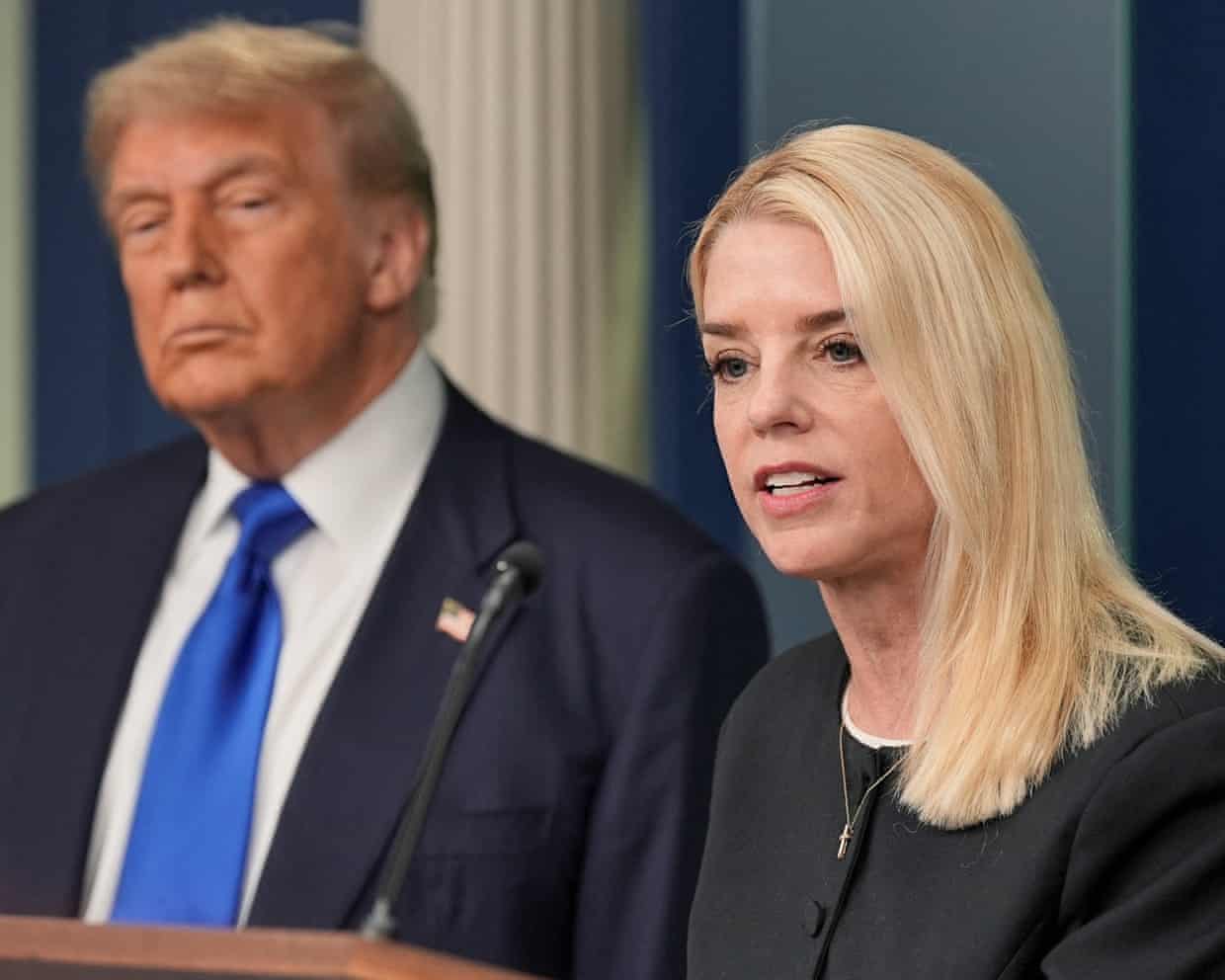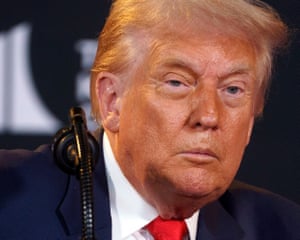
Trump uses FBI and Justice Department to escalate his long-standing feud with Adam Schiff
Entities mentioned:
- Donald Trump: Revenge, Power, Control
- Adam Schiff: Justice, Duty, Self-preservation
- Kash Patel: Loyalty, Power, Influence
- Pam Bondi: Duty, Loyalty, Professional pride
- Letitia James: Justice, Duty, Professional pride
- Preet Bharara: Justice, Professional pride, Duty
- Ed Martin: Loyalty, Professional pride, Influence
Article Assessment:
Credibility Score: 75/100
Bias Rating: 45/100 (Center)
Sentiment Score: 35/100
Authoritarianism Risk: 65/100 (Authoritarian Tendencies)
Bias Analysis:
The article presents multiple perspectives and cites various sources, maintaining a relatively balanced approach. However, there is a slight lean towards framing Trump's actions negatively, while giving more space to Schiff's defenses.
Key metric: Rule of Law Index
As a social scientist, I analyze that this article highlights a concerning trend of potential abuse of power and weaponization of federal agencies for political purposes. The use of declassified FBI documents and Justice Department investigations to target political opponents, particularly Adam Schiff, raises serious questions about the integrity of democratic institutions and the separation of powers. This situation could significantly impact the Rule of Law Index, as it demonstrates a possible erosion of checks and balances and the independence of law enforcement agencies. The apparent retaliatory nature of these actions against perceived political enemies could undermine public trust in government institutions and the fair application of justice, potentially leading to a decline in the U.S.'s standing on this metric internationally.

Judges approve Trump’s pick as interim US Attorney in Manhattan
Entities mentioned:
- Jay Clayton: Ambition, Power, Professional pride
- Donald Trump: Control, Power, Influence
- Federal Court Judges (SDNY): Duty, Justice, Obligation
- Senators: Wariness, Control, Duty
- Alina Habba: Ambition, Power, Professional pride
- John Sarcone III: Ambition, Power, Professional pride
- Geoff Berman: Duty, Justice, Professional pride
Article Assessment:
Credibility Score: 75/100
Bias Rating: 55/100 (Center)
Sentiment Score: 45/100
Authoritarianism Risk: 35/100 (Generally Democratic)
Bias Analysis:
The article presents a fairly balanced view of the situation, including both successes and challenges in Trump's US Attorney appointments. While it notes controversies, it also acknowledges when appointments have been unchallenged, maintaining a generally neutral tone.
Key metric: Rule of Law Index
As a social scientist, I analyze that this article highlights the ongoing tension between executive power and judicial oversight in the appointment of US Attorneys. The approval of Jay Clayton by federal judges, despite his lack of prosecutorial experience, suggests a shift in the balance of power between the executive branch and the judiciary. This appointment, coupled with the resistance to other Trump nominees, indicates a complex interplay of institutional checks and balances. The article underscores the importance of judicial independence and the role of the Senate in confirming key legal positions, which directly impacts the Rule of Law Index. The varying responses of different district courts to Trump's interim appointments further illustrate the decentralized nature of the US legal system and the potential for regional variations in the application of federal law.

Judge to decide Trump appointee Alina Habba's fate as US attorney
Entities mentioned:
- Alina Habba: Ambition, Power, Control
- Donald Trump: Power, Control, Loyalty
- Judge Matthew Brann: Duty, Justice, Righteousness
- Julien Giraud Jr.: Self-preservation, Justice, Freedom
- Desiree Grace: Professional pride, Duty, Justice
- Pam Bondi: Loyalty, Power, Control
Article Assessment:
Credibility Score: 75/100
Bias Rating: 45/100 (Center)
Sentiment Score: 35/100
Authoritarianism Risk: 65/100 (Authoritarian Tendencies)
Bias Analysis:
The article presents multiple viewpoints, including those of the Trump administration, the defendant, and legal experts. While it highlights concerns about the appointment process, it also includes the DOJ's defense of its actions, maintaining a relatively balanced perspective.
Key metric: Rule of Law Index
As a social scientist, I analyze that this case highlights a significant challenge to the traditional process of appointing U.S. attorneys, potentially impacting the Rule of Law Index. The unprecedented maneuvers by the Trump administration to keep Habba in power, despite lack of Senate confirmation, raise concerns about the separation of powers and the integrity of the justice system. This situation could weaken public trust in legal institutions and potentially set a precedent for future administrations to bypass established appointment procedures. The case also demonstrates the tension between executive authority and legislative oversight, which is crucial for maintaining checks and balances in a democratic system. The outcome of this decision could have far-reaching implications for the interpretation of federal vacancy laws and the limits of presidential power in appointing key law enforcement officials.

Democrats introduce joint resolution to end Trump’s ‘lawless’ DC takeover
Entities mentioned:
- Democrats: Justice, Righteousness, Control
- Donald Trump: Power, Control, Ambition
- Washington DC: Self-preservation, Freedom, Security
Article Assessment:
Credibility Score: 65/100
Bias Rating: 35/100 (Lean Left)
Sentiment Score: 30/100
Authoritarianism Risk: 55/100 (Mixed/Neutral)
Bias Analysis:
The article leans left in its framing, using terms like 'lawless' that cast Trump's actions in a negative light. The focus on Democratic opposition without equal representation of the administration's perspective suggests a left-leaning bias.
Key metric: Rule of Law Index
As a social scientist, I analyze that this article highlights a significant conflict between the Democratic Party and the Trump administration over control of Washington DC. The introduction of a joint resolution by Democrats to end what they term a 'lawless' takeover of DC by Trump indicates a struggle for power and control over the capital city. This action suggests concerns about potential overreach of executive power and its implications for democratic governance. The use of the term 'lawless' implies that Democrats view Trump's actions as unconstitutional or illegal, which could have serious implications for the rule of law in the United States. This situation may lead to increased political polarization and could potentially erode public trust in governmental institutions.
Tracking Trump’s criminal cases
Entities mentioned:
- Donald Trump: Self-preservation, Power, Control
- Judge Juan Merchan: Justice, Duty, Professional pride
- Jack Smith: Duty, Professional pride, Justice
- Manhattan District Attorney's Office: Justice, Duty, Righteousness
Article Assessment:
Credibility Score: 75/100
Bias Rating: 45/100 (Center)
Sentiment Score: 35/100
Authoritarianism Risk: 40/100 (Generally Democratic)
Bias Analysis:
The article presents a factual timeline of events without overtly favoring any political stance. It includes details from various cases and perspectives, maintaining a relatively neutral tone in its reporting.
Key metric: Rule of Law Index
As a social scientist, I analyze that this article significantly impacts the Rule of Law Index for the United States. The conviction and subsequent unconditional discharge of a president-elect in a criminal case, coupled with the dropping of federal cases against him, presents a complex scenario for the rule of law. On one hand, it shows that even high-ranking officials can be held accountable through the legal system. On the other hand, the inability to impose penalties and the dismissal of other cases may suggest that political power can influence legal outcomes. This situation could potentially weaken public perception of equal application of the law and the independence of the judiciary, key components of the Rule of Law Index.
- Read more about Tracking Trump’s criminal cases
- Log in to post comments

Federal judge questions if Trump’s deployment of the National Guard in the Los Angeles area is lawful
Entities mentioned:
- Judge Charles Breyer: Justice, Duty, Wariness
- President Donald Trump: Power, Control, Security
- Gov. Gavin Newsom: Justice, Duty, Self-preservation
- Justice Department: Control, Duty, Security
- California National Guard: Duty, Obligation, Security
Article Assessment:
Credibility Score: 75/100
Bias Rating: 45/100 (Center)
Sentiment Score: 35/100
Authoritarianism Risk: 25/100 (Generally Democratic)
Bias Analysis:
The article presents multiple viewpoints, including those of the judge, the Justice Department, and California's representatives. While it gives slightly more space to the judge's skeptical questioning, it still includes the government's arguments, maintaining a relatively balanced perspective.
Key metric: Rule of Law Index
As a social scientist, I analyze that this case highlights significant tensions between federal and state authority, as well as concerns about the potential misuse of military forces for domestic law enforcement. The judge's skepticism about the continued deployment of federalized National Guard troops raises critical questions about the limits of presidential power and the interpretation of the Posse Comitatus Act. This legal challenge could have far-reaching implications for the balance of power between the executive branch and states, potentially affecting the Rule of Law Index by setting precedents on the use of military forces in civilian contexts. The outcome of this case may influence future interpretations of executive authority in deploying federal forces domestically, which could impact democratic norms and civil liberties.

DOJ Removes All Mentions Of Justice From Website
Entities mentioned:
- Department of Justice: Control, Power, Loyalty
- Donald Trump: Power, Control, Revenge
- Pam Bondi: Loyalty, Power, Control
- Lindsey Graham: Loyalty, Power, Influence
- Joe Biden: Justice, Duty, Legacy
Article Assessment:
Credibility Score: 15/100
Bias Rating: 20/100 (Extreme Left)
Sentiment Score: 10/100
Authoritarianism Risk: 90/100 (Totalitarian Risk)
Bias Analysis:
The article exhibits extreme left-wing bias through its hyperbolic portrayal of the Trump administration and use of inflammatory language. It presents an unrealistic scenario without credible sources, using satire to criticize right-wing policies.
Key metric: Rule of Law Index
As a social scientist, I analyze that this article, if factual, would represent a severe deterioration in the US Rule of Law Index. The described actions of removing all mentions of justice, fairness, and integrity from the Department of Justice website and firing employees associated with civil rights legislation would significantly undermine the principles of checks and balances, equal treatment under the law, and protection of fundamental rights. Such actions would likely lead to a drastic decline in the US's standing in global rule of law rankings, potentially placing it closer to authoritarian regimes. This would have far-reaching implications for democratic institutions, civil liberties, and international relations.

Trump officials move to punish lawyer who tried to block client’s deportation
Entities mentioned:
- Joshua Schroeder: Justice, Duty, Professional pride
- US Department of Justice: Control, Power, Righteousness
- Trump administration: Control, Power, Righteousness
- Donald Trump: Power, Control, Ambition
Article Assessment:
Credibility Score: 75/100
Bias Rating: 35/100 (Lean Left)
Sentiment Score: 25/100
Authoritarianism Risk: 70/100 (Authoritarian Tendencies)
Bias Analysis:
The article leans left in its framing, portraying the government's actions negatively and emphasizing potential threats to legal representation. While it includes some government perspective, the overall tone is sympathetic to Schroeder and critical of the administration's approach.
Key metric: Rule of Law Index
As a social scientist, I analyze that this case demonstrates a potential erosion of the Rule of Law Index in the United States. The Trump administration's attempt to sanction an attorney for defending his client's rights could have a chilling effect on legal representation in immigration cases. This action may discourage lawyers from vigorously defending their clients, potentially undermining due process and access to justice. The use of government power to target individual attorneys who challenge deportation orders could be seen as an attempt to consolidate executive power over the judicial system, particularly in immigration matters. This trend, if continued, could significantly impact the independence of the legal profession and the overall strength of the rule of law in the country.

US judge orders Trump administration to restore part of UCLA’s frozen funding
Entities mentioned:
- Trump administration: Control, Power, Influence
- UCLA: Self-preservation, Freedom, Justice
- US judge: Justice, Duty, Professional pride
Article Assessment:
Credibility Score: 70/100
Bias Rating: 35/100 (Lean Left)
Sentiment Score: 45/100
Authoritarianism Risk: 35/100 (Generally Democratic)
Bias Analysis:
The article leans slightly left, evident in the framing of Trump administration actions as contentious. However, it reports on a factual court decision without overtly partisan language.
Key metric: Rule of Law Index
As a social scientist, I analyze that this article highlights a tension between executive power and judicial oversight. The Trump administration's attempt to freeze UCLA's funding, likely for political reasons, was partially reversed by a federal judge. This judicial intervention demonstrates the checks and balances system at work, but also indicates potential executive overreach. The case impacts the Rule of Law Index by showcasing the judiciary's role in limiting executive actions that may be politically motivated or legally questionable. It underscores the importance of an independent judiciary in maintaining democratic norms and protecting institutions from political interference.

Trump’s DC police takeover was fueled by attack on former DOGE staffer and his own observations of homelessness, allies say
Entities mentioned:
- Donald Trump: Control, Power, Legacy
- Muriel Bowser: Self-preservation, Duty, Unity
- Metropolitan Police Department: Duty, Professional pride, Security
- National Guard: Duty, Security, Obligation
- Pam Bondi: Loyalty, Control, Professional pride
- Brian Schwalb: Justice, Indignation, Duty
- Pamela Smith: Professional pride, Duty, Security
- Jeanine Pirro: Loyalty, Control, Justice
- Chuck Schumer: Political opposition, Moral outrage, Justice
- Gavin Newsom: Political opposition, Moral outrage, Freedom
Article Assessment:
Credibility Score: 65/100
Bias Rating: 55/100 (Center)
Sentiment Score: 30/100
Authoritarianism Risk: 75/100 (Authoritarian Tendencies)
Bias Analysis:
The article presents multiple viewpoints, including those of the Trump administration and local DC officials. While it leans slightly towards skepticism of the federal takeover, it provides context and attempts to balance the narrative.
Key metric: Rule of Law Index
As a social scientist, I analyze that this unprecedented federal takeover of a local police force significantly impacts the Rule of Law Index for the United States. The action raises serious questions about the separation of powers, local autonomy, and the appropriate use of federal authority. While the stated goal is to address crime and homelessness, the unilateral nature of the decision and the apparent lack of a clear emergency situation suggest potential overreach. This move could lead to a deterioration in the perception of checks and balances within the US government system, potentially lowering the country's score on measures of government powers and fundamental rights within the Rule of Law Index. The conflicting narratives between federal and local officials regarding crime statistics and the necessity of the intervention further complicate the situation, potentially eroding public trust in both levels of government.